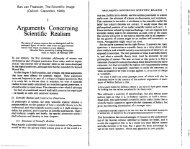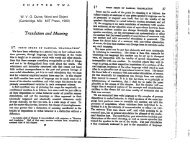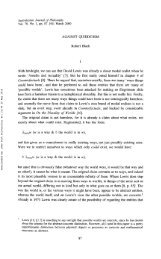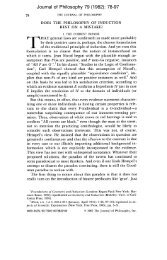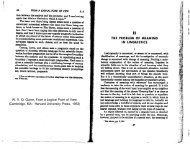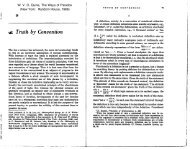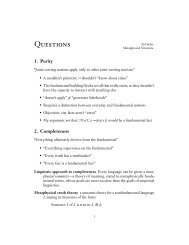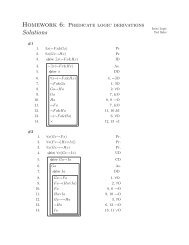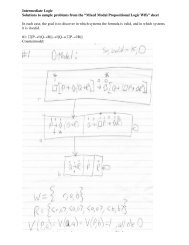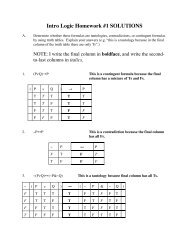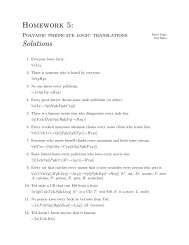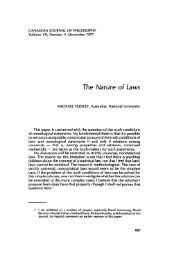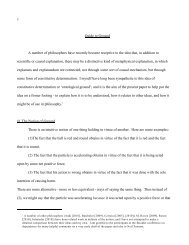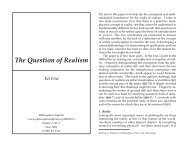Dummett - Wittgenstein's Philosophy of Mathematics.pdf - Ted Sider
Dummett - Wittgenstein's Philosophy of Mathematics.pdf - Ted Sider
Dummett - Wittgenstein's Philosophy of Mathematics.pdf - Ted Sider
Create successful ePaper yourself
Turn your PDF publications into a flip-book with our unique Google optimized e-Paper software.
MICHAEL DUMMETT<br />
a method. Normally one would say that the sieve <strong>of</strong> Eratosthenes<br />
was such a method; but with a large number one would not<br />
-could not-use the sieve, but would resort to some more power-<br />
ful criterion. It will be said that this is a mere practical, not a<br />
theoretical, matter, due to the comparative shortness <strong>of</strong> our<br />
lives. But if some fanatic devoted his life to computing, by means<br />
<strong>of</strong> the sieve, the primality <strong>of</strong> some very large number proved<br />
to be prime by more powerful means, and arrived at the con-<br />
clusion that it was composite, we should not abandon our pro<strong>of</strong><br />
but say that there must be some error in his computations. This<br />
shows that we are taking the "advanced" test, and not the sieve,<br />
as the criterion for primality here: we use the theorem as the<br />
standard whereby we judge the computation, and not conversely.<br />
The computation is <strong>of</strong> no use to us because it is not surveyable.<br />
A mathematical pro<strong>of</strong>, <strong>of</strong> which computations are a special case,<br />
is a pro<strong>of</strong> in virtue <strong>of</strong> our using it to serve a certain purpose;<br />
namely, we put the conclusion or result in the archives, that is,<br />
treat it as unassailable and use it as a standard whereby to judge<br />
other results. Now something cannot serve this purpose, and<br />
hence is not a mathematical pro<strong>of</strong>, unless we are able to exclude<br />
the possibility <strong>of</strong> a mistake's having occurred in it. We must be<br />
able to "take in" a pro<strong>of</strong>, and this means that we must be certain<br />
<strong>of</strong> being able to reproduce the same pro<strong>of</strong>. We cannot in general<br />
guarantee that we shall be able to repeat an experiment and get<br />
the same result as before. Admittedly, if we get a different<br />
result, we shall look for a relevant difference in the conditions<br />
<strong>of</strong> the experiment; but we did not have in advance a clear<br />
conception <strong>of</strong> just what was to count as a relevant difference.<br />
(It is not quite clear whether in saying that we must be able<br />
to reproduce a pro<strong>of</strong> Wittgenstein means that one must be able<br />
to copy from the written pro<strong>of</strong> before one and be certain that<br />
one has copied without error, or that one must be able to read<br />
the pro<strong>of</strong> and understand it so that one could write it down<br />
without referring to the original written pro<strong>of</strong>, so that the<br />
possibility <strong>of</strong> a misprint becomes more or less irrelevant. It does<br />
not seem to affect the argument which interpretation is adopted.)<br />
Thus the computation, for a very large number proved prime<br />
by other means, <strong>of</strong> its primality by means <strong>of</strong> Eratosthenes' sieve<br />
342



